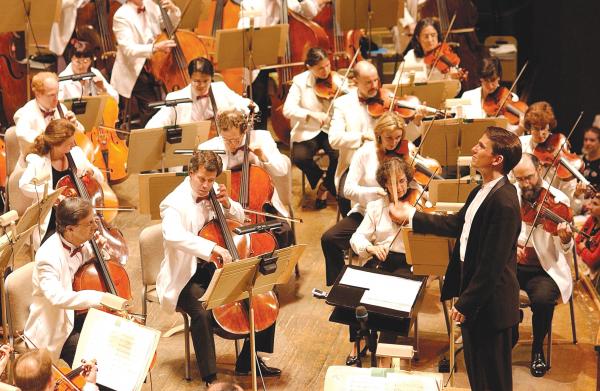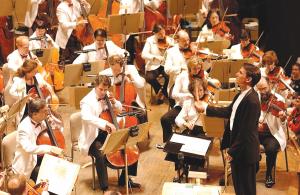The Boston Pops perform a tribute to Barbra Streisand tomorrow night at the UGA Performing Arts Center. Flagpole spoke with its longtime conductor, Keith Lockhart about the changes with the orchestra over the years. Stay tuned to Culture Briefs Thursday for another short interview with Lockhart just before the performance and a review of the concert.

Keith Lockhart conducts the Boston Pops.
Flagpole: Tell me about the Boston Pops and your role in it.
Keith Lockhart: Well, the Boston Pops is, well let me see now, a 120-year-old institution that was founded by the founding fathers and mothers of the Boston Symphony Orchestra to play a wider variety of music than the traditional symphony orchestra, for a wider variety of audiences than a traditional symphony. We’ve been doing that for a century and a quarter now, 50 years of which was under the direction of the famous Arthur Fielder, then my immediate predecessor John Williams, the composer of Star Wars and other unsuccessful movies like that. I have been conductor of the Boston Pops for 18 years, bringing great symphonic music of all sorts all around the country and to Asia, on record and on TV.
FP: When you choose selections for a performance, what do you consider? What is that process like?
KL: Well, it has to do something with what audience we’re reaching for, where we’re going. This tour is going to the Southeast and a lot of it is going to Florida. It also has to do with a sense of occasion. In this particular case: Barbra Streisand, who is one of the few voices you can truly say are more iconic than the songs they sing. People like her, and Frank Sinatra, Ella Fitzgerald, are people who are so famous as singers that the songs that they sang are more associated with them than they are with the people who composed them. This is Barbra Streisand’s 70th birthday year, weirdly enough. We talked to Ms. Streisand herself and she said, “Boy, it would be wonderful if you guys would do a tribute concert to me.” So, this one kind of started from there and built in that direction, starting with Barbra, and then going with songwriters [and] composers who were associated with Barbra throughout her career. Then to Marvin Hamlisch, who died last year, but was for many years Barbra’s music director, and the great Broadway composer of things like A Chorus Line.
FP: Will you at some point perform with Barbra Streisand during your performances?
KL: No, Barbra Streisand is hardly performing now. If she were to come out on the road with the Boston Pops, she would require five months of rehearsal, which would probably be more than we could give her. So, we’re bringing Ann Hampton Callaway, who’s a wonderful American singer. She sings the Barbra Streisand songbook; she’s also a songwriter who has written songs for Barbra Streisand.
FP: What do you think audiences are looking for when they go to a Boston Pops performance? What do they want to walk away with?
KL: I think what we would like them to walk away, with at any rate, is a sense of how exciting and involving an orchestral performance can be. We think of orchestral performances as being rather stuffy—classical, referential sort of affairs—and we don’t feel that way at the Boston Pops. We really feel that this music can be fun and entertaining and still provide some great cultural experiences so what we hope they end up with is “Wow. I never knew an orchestral concert could be that much fun.”
FP: You’ve performed concerts with musicians like Aimee Mann and Ben Folds. What do those collaborations do for the Boston Pops’ brand?
KL: You know, the danger of anything like the Boston Pops—which is less classical, therefore more tied in with whatever the trends of the day are—the danger with an organization like this is to kind of get stuck with the same trends and therefore grow old along with your audience. What we always have to keep doing is looking for ways to… well, to give you an example: when I came to the orchestra at 35, I had people who were my age come up to me and go, “Wow, the Boston Pops; it’s great! Wow, my parents really love going there.” I thought, “Well, thats fine, but in 25 years, that’s not going to be so good.” [We’re looking] to find ways to continue to keep having an audience that turns over and that recognizes that this is not a group that performs for 70-year-olds or a group that performs for 20-year-olds; it really does perform the gamut of experiences. What we’ve tried to do in the last few years [with] people like Ben Folds, also bands like My Morning Jacket and Guster, is to bring in totally new groups of people, even if they don’t become permanent fans at the age of 25 or 30. It sticks in their head that this is an organization that can be part of their cultural experience as well.
FP: Given the natural change in tastes and popular music, or what’s available, what about the Boston Pops does not change, or won’t change?
KL: I think what has kept us going and vital for a century and a quarter is the idea that it’s all about quality, and it’s about not just surrendering to the flavor of the month. It’s not going to be a Britney Spears kind of backup band anytime soon. [It’s] about collaborations and music with interesting and creative performers from all sides of the musical universe and from all generations. Ultimately, it’s always been about the orchestra being front and center in our own performances and not serving as a backup band, because then when people walk away from the concert, they walk away with the impression of the Boston Pops; not just an impression of who was fronting us.
FP: Can you tell me about the other conducting you do and how it compares to conducting the Boston Pops?
KL: Well, I have a fairly busy career that involved, up until a couple of years ago, I was music director of the Utah Symphony in Salt Lake City, which was a traditional American music directorship with, you know, Beethoven and Mozart and Brahms and Mahler, etc., etc. For the last three years now, I’ve been principal conductor of the BBC Concert Orchestra in London, and I’m also the artistic director of a summer performance institute, the Brevard Music Festival in western North Carolina, not too far from Athens, for that matter. What those things do are they keep me growing and vital and energized as a musician, and they keep me doing the kinds of repertoire that keep my mind focused and keep me moving forward as a musician; things balance out very nicely. I just finished a two-and-a-half-week tour with the BBC group on the west coast of the States and came home, oh, about three days ago, and now I’m leaving tomorrow to go on this tour where you’ll see me in Athens on Wednesday.
FP: What do you think is unique about the Boston Pops in terms of its place in American music?
KL: I think one of the things that’s unique about it is it’s one of the few arts organizations in this country that really has a national constituency. We can go across the country and we can play in Phoenix or Las Vegas, and people come up and say, “I can’t believe it’s been five years since you’ve been here.” That’s a great thing to have because we’re called the Boston Pops, but we also call ourselves America’s Orchestra, because we really do have a fanbase that really goes all the way across the country, because of our association with the Fourth of July and other big celebrations where Americans come together.
Like what you just read? Support Flagpole by making a donation today. Every dollar you give helps fund our ongoing mission to provide Athens with quality, independent journalism.










